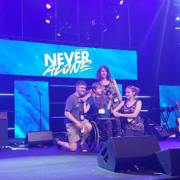Standing Up for Children
As Christians, we place our faith and trust in God. And as the Church we feel connected to fellow Christians because of our shared faith. We naturally want to extend that faith and trust those around us, especially if they are fellow Christians.
However, sin is a very real and present danger. Although we warn children about stranger danger, strangers are rarely the molesters of children. In fact, studies indicate that a child knows his/her offender in 90 percent of abuse cases. Many times, the offender is someone who was trusted, someone others thought would be “good with kids.”
What does this have to do with nursing? Here are some words I found from a top 10 list of necessary qualities for a nurse: caring, empathetic, organized, emotionally stable, adaptable, and having endurance. These traits, in conjunction with your training, prepare you to help your church become and stay a safe place for children.
As a nurse you’ve likely received training about child abuse throughout your career. You’ve learned the physical and emotional signs that may indicate abuse. You’ve perhaps seen how abuse affects your patients, whether as a child or as an adult who must deal with difficult childhood experiences. You know how to respond to child abuse. As a mandated reporter, you’ve most likely had to report it.
Our Lutheran churches and schools do not always have the same amount of education you have. In fact, if a pastor or teacher graduated 15 or more years ago, they most likely did not even discuss child abuse in college, much less talk about the need to report it.
You are in a unique position to advocate for more education for those who interact with children! This does not mean you would have to provide the training yourself. You can offer resources to the church to do the training. WELS has an excellent free online training program for people who interact with children.
Your knowledge can also be helpful to your church as it creates and reviews policies surrounding the care of children. Policies need to include the process a volunteer must follow in order to work with children, safe environmental standards, how to respond to allegations of abuse, and training requirements. Ask your church if it has a childcare policy you can review.
If it does not have a policy, ask if you can be on a committee to explore this. You do not have to be an expert to help form policy; many examples and information about best practices are available on the internet. For example, the Centers for Disease Control has an online manual to assist with creating policies and procedures.
As a nurse you bring a unique skill set and knowledge base to your church. By simply sharing what you know with family and friends you can engage their help in fighting child abuse. “Each of you should use whatever gift you have received to serve others, as faithful steward of God’s grace in its various forms.” 1 Peter 4:10.
Michelle Markgraf is the Director of Family Support Services at Kingdom Workers and an advisory board member to Freedom for the Captives.
SPECIAL MINISTRIES
Learn about the ministry work of WELS Special Ministries.
SUPPORT SPECIAL MINISTRIES
Support the ministry work of WELS Special Ministries.








